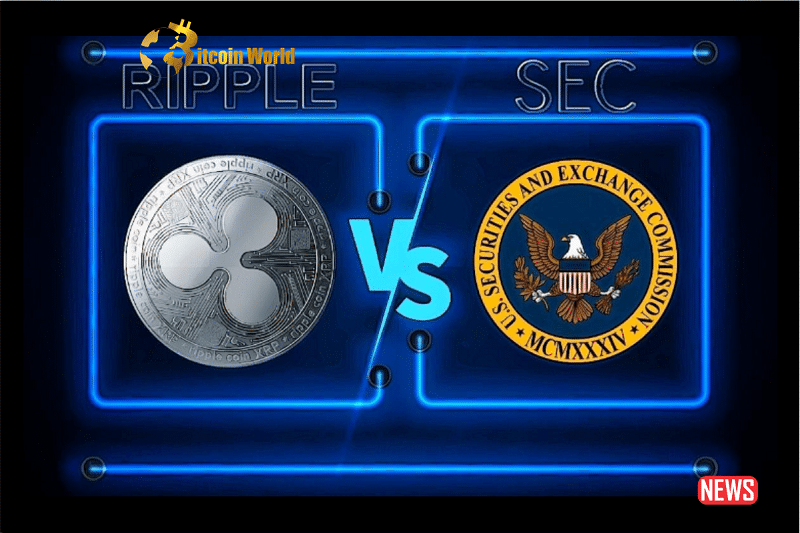The ongoing legal showdown between Ripple and the U.S. Securities and Exchange Commission (SEC) has become a cornerstone debate in the cryptocurrency world. Why? Because it touches upon fundamental questions about how digital assets are classified and regulated. Recently, the spotlight has been firmly fixed on the SEC’s definition of a “common enterprise,” a crucial element in determining whether XRP constitutes a security. Let’s dive into the latest developments and the strong criticisms leveled against the SEC’s stance.
Has the SEC’s Argument on ‘Common Enterprise’ Hit a Wall?
Legal experts and Ripple’s defense team are increasingly vocal about what they perceive as inconsistencies and contradictions in the SEC’s arguments. A key figure in this narrative is John E. Deaton, a prominent legal expert and an amicus curiae (friend of the court) in the Ripple case. Through a detailed Twitter thread, Deaton didn’t hold back in his critique of the SEC’s fluctuating definition of “common enterprise.” His comments were ignited by a statement from Stuart Alderoty, Ripple’s Chief Legal Officer, who brought to light a telling case from the SEC’s own history: SEC Realty Corp. in 1994.
What did this 1994 case reveal? According to Alderoty, the court in SEC Realty Corp. explicitly stated that a “common enterprise” isn’t a necessity if investors’ fortunes are directly tied to the efforts of the promoter. This is a significant point because, as Alderoty suggests, it directly clashes with the SEC’s current approach in the Ripple case. Is this a case of the SEC changing its tune to fit its narrative? Many, including Deaton, believe so.
The Ever-Shifting Sands of the SEC’s Argument
Deaton further elaborated on the SEC’s evolving stance, pointing out a significant shift in their theory. Initially, the SEC seemed to argue that the entire XRP ecosystem itself constituted a common enterprise. Think about that for a moment – this would encompass every XRP holder, every exchange listing XRP, and even businesses accepting XRP as payment! To bolster this broad claim, the SEC intended to bring in an expert witness. However, in a blow to the SEC’s strategy, the judge dismissed the expert’s opinion, deeming it illogical.
Deaton didn’t mince words, labeling the SEC’s argument as “insane” and their defense as a constantly changing, “schizophrenic” approach. He highlighted yet another pivot in the SEC’s theory, where they then asserted that XRP *itself* represents the common enterprise. This constant shifting of the goalposts raises questions about the SEC’s clarity and consistency in applying the law.
Echoes of Disagreement: Other Legal Voices Weigh In
Deaton’s criticisms are not isolated. Bill Morgan, another lawyer closely following the case, echoed similar sentiments. Morgan believes the SEC deserves a strong rebuke for failing to adequately demonstrate the “common enterprise” aspect alone, not to mention other challenges within their case. He also dismantled the SEC’s argument that the fungibility of XRP proves a common enterprise, cleverly pointing out that the same logic could be applied to something as universally traded as an ounce of gold.
Alderoty further reinforced this point by referencing the historic ‘Howey’ case of 1946. In that case, the SEC argued that a “common enterprise” wasn’t necessary if a “community of interest” existed. The court rejected this argument, highlighting a pattern of the SEC misinterpreting legal precedents.
Deaton summarized the core issue succinctly: the SEC appears to openly disregard established legal principles, even stating that a “common enterprise” isn’t a distinct element of an “investment contract.” This bold assertion has drawn significant scrutiny and criticism from legal experts.
What Does This Mean for XRP’s Market?
Against the backdrop of this intense legal battle, XRP’s market value has experienced its share of volatility. Here’s a snapshot of its recent performance:
- Current Price: $0.43 (at the time of writing)
- Daily Change: Down by 0.1%
- Weekly Change: Down by 3.12%
- Monthly Change: Down by 18.06%
While market fluctuations are common in the cryptocurrency space, the ongoing legal uncertainty surrounding Ripple undoubtedly plays a role in investor sentiment.
The Road Ahead: Seeking Clarity in Crypto Regulation
The Ripple-SEC saga is more than just a legal dispute between two entities. It’s a landmark case that has significant implications for the entire cryptocurrency industry. The core of the debate revolves around how digital assets should be classified and regulated. The arguments surrounding the “common enterprise” element highlight the complexities and the potential for inconsistent application of existing securities laws to this novel asset class.
Key Takeaways:
- Inconsistent Arguments: Legal experts argue the SEC has presented inconsistent and shifting definitions of “common enterprise.”
- Historical Precedent: Past SEC cases, like SEC Realty Corp. and the Howey case, are being used to highlight alleged contradictions in the SEC’s current stance.
- Impact on XRP: The legal uncertainty continues to influence XRP’s market performance.
- Broader Implications: The outcome of this case could set a precedent for how other cryptocurrencies are regulated in the US.
Looking to the Future
The cryptocurrency community is watching the Ripple-SEC case with bated breath. The resolution of this courtroom standoff is eagerly anticipated, not just by Ripple and XRP holders, but by the entire industry. The hope is for clarity, fair treatment, and a regulatory framework that fosters innovation while protecting investors. Will the SEC be forced to reconsider its arguments? Will the court side with Ripple’s interpretation of the law? The answers to these questions will have a profound impact on the future of cryptocurrency regulation in the United States and beyond.
Disclaimer: The information provided is not trading advice, Bitcoinworld.co.in holds no liability for any investments made based on the information provided on this page. We strongly recommend independent research and/or consultation with a qualified professional before making any investment decisions.


